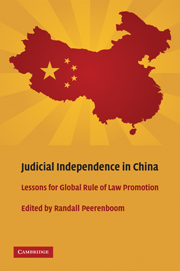Book contents
- Frontmatter
- Contents
- Contributors
- 1 Introduction
- 2 Halfway Home and a Long Way to Go
- 3 A New Approach for Promoting Judicial Independence
- 4 The Party and the Courts
- 5 Judicial Independence in China
- 6 A New Analytic Framework for Understanding and Promoting Judicial Independence in China
- 7 Judicial Independence and the Company Law in the Shanghai Courts
- 8 Local Courts in Western China
- 9 The Judiciary Pushes Back
- 10 Corruption in China's Courts
- 11 A Survey of Commercial Litigation in Shanghai Courts
- 12 Judicial Independence in Authoritarian Regimes
- 13 Judicial Independence in East Asia
- Index
- References
9 - The Judiciary Pushes Back
Law, Power, and Politics in Chinese Courts
Published online by Cambridge University Press: 05 June 2012
- Frontmatter
- Contents
- Contributors
- 1 Introduction
- 2 Halfway Home and a Long Way to Go
- 3 A New Approach for Promoting Judicial Independence
- 4 The Party and the Courts
- 5 Judicial Independence in China
- 6 A New Analytic Framework for Understanding and Promoting Judicial Independence in China
- 7 Judicial Independence and the Company Law in the Shanghai Courts
- 8 Local Courts in Western China
- 9 The Judiciary Pushes Back
- 10 Corruption in China's Courts
- 11 A Survey of Commercial Litigation in Shanghai Courts
- 12 Judicial Independence in Authoritarian Regimes
- 13 Judicial Independence in East Asia
- Index
- References
Summary
Despite the passage of hundreds of laws and the expansion of the judiciary since the late 1970s, a dominant theme in the literature is that Chinese courts have enjoyed little judicial independence. The courts are often portrayed as little more than a loyal subordinate of the party–state that carefully carries out assigned tasks; they have virtually no will or capacity to resist the party–state's interference.
However, recent developments have raised questions about how far, and under what conditions, the conventional wisdom that Chinese courts are incapable of resisting political pressure from superior powers holds up. The courts have refused to accept jurisdiction over some types of disputes that have arisen in China's unprecedented social transformation. This strategic retraction rather than expansion of judicial power is surprising in light of the global trend toward judicialization and the trend in China to extend the government's policy of “governance in accordance with law” to a widening range of economic and social activities.
For some of these disputes, the courts' refusal to exercise jurisdiction may be explained by the inferior position of the courts: when superior political powers such as the party or the government do not want the courts to be involved in the dispute resolution process for political reasons, the courts have little room to disobey. This has been well illustrated in the handling of urban housing demolition disputes.
- Type
- Chapter
- Information
- Judicial Independence in ChinaLessons for Global Rule of Law Promotion, pp. 180 - 195Publisher: Cambridge University PressPrint publication year: 2009
References
- 2
- Cited by

